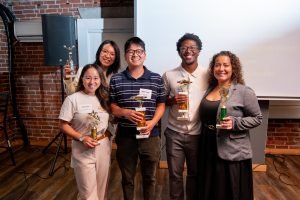-
Sonia Lobo, PhD, E-RYT, associate dean for research and scholarship at Geisinger College. (SUBMITTED)
-

Julie Byerley, MD, MPH, president of Geisinger College of Health (COURTESY OF WILLOW SPRINGS PHOTOGRAPHY)
1 of 2
Sonia Lobo, PhD, E-RYT, associate dean for research and scholarship at Geisinger College. (SUBMITTED)
Last month, the U.S. Secretary of Health and Human Services issued a call to action: medical schools must expand their nutrition education. At Geisinger Commonwealth School of Medicine, we are ahead of the curve.
From day one, Geisinger has prioritized prevention and primary care excellence, recognizing nutrition is key to chronic disease prevention and treatment. We’ve also reached out to the community to provide inspiration and education on behaviors that promote health and well-being such as healthy eating.
The College’s Preventive Medicine series was founded for that purpose. On Oct. 7, the lecture series welcomes Michael Greger MD, a founding member of the American College of Lifestyle Medicine and author of several New York Times best-selling books. He will deliver a talk at 5:30 p.m. at our medical school in Scranton (525 Pine St.). Everyone is welcome.
Every Geisinger medical student receives foundational instruction in nutrition through required coursework. Despite our strong curriculum, we know there’s room to grow. A recent study published in BMC Medical Education by Geisinger students and faculty revealed that our curriculum includes about 14 hours of formal nutrition instruction — more than many peer institutions. Most of that has been concentrated in the preclinical years and now we are integrating nutrition instruction into clinical training.
One of our newest initiatives, “Nutriments,” delivers concise, clinically relevant nutrition modules aligned with disease presentations. These help students connect nutrition directly to patient care — and the feedback is overwhelmingly positive.
Students have stepped up, organizing community education events, conducting research on nutrition counseling, and proposing curriculum enhancements. Soon, we’ll launch clinical rotations where students shadow dietitians and apply nutrition knowledge in real-world settings.
These efforts are driven, in great part, by the voices of our community. A recent survey of people in our region revealed:
- 91% believe doctors should have strong nutrition knowledge
- Only 5% feel their nutrition concerns are consistently addressed
- 64% find nutrition information overwhelming or conflicting
- Just 19% cite physicians as their primary source of nutrition advice
People want practical resources, regular nutrition discussions during appointments, and personalized guidance based on their health history and goals. They know that nutrition isn’t one-size-fits-all — and they trust their doctors to help them navigate it.
At Geisinger, we make healthy eating a priority. Our Fresh Food Farmacy provides free, medically tailored meals to patients with diet-responsive conditions. Our Student Food Pantry ensures no learner goes hungry. And our monthly public education events bring nutrition science to the broader community.
As chronic diseases rise and misinformation spreads, the need for physician-led nutrition guidance has never been greater. Geisinger College of Health Sciences is proud to meet that need.
Julie Byerley, MD, MPH, is president of Geisinger College of Health Sciences. Sonia Lobo, PhD, E-RYT, is associate dean for research and scholarship at Geisinger College.







